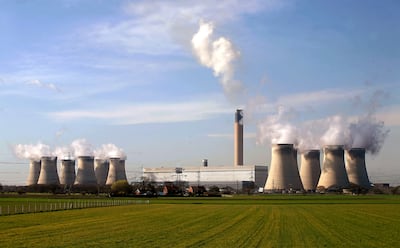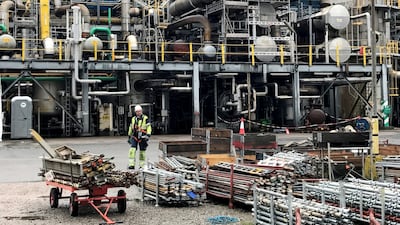A surge in gas prices globally has led to the closure of two of the UK’s largest fertiliser plants, sparking supply fears in the food industry.
Record energy costs are affecting countries across Europe, leading some nations to impose emergency measures to cap prices.
Experts have warned there is a “real risk” gas supplies in Europe could run out.
“Storage stocks are at record lows and there isn’t currently any spare supply capacity that is exportable anywhere in the world,” said James Huckstepp, manager for EMEA gas analytics at S&P Global Platts.
“This is a real risk.”
In the UK, the rising costs have led to fertiliser firm CF Industries Holdings closing two of its sites in the north of England, in Teesside and Cheshire.
The sites are responsible for 40 per cent of the UK fertiliser market, raising fears there could be a shortage of ammonium nitrate which would hit the food industry.
On Friday, Norwegian fertiliser producer Yara International ASA, which generates a third of the world’s ammonia which is used in fertilisers warned that by next week it will also have curtailed about 40 per cent of its European ammonia output capacity.
It said production will be curbed at plants in the UK, the Netherlands, Germany, Norway, Italy, France and Belgium.
As well as gas costs curbing output of fertilisers, which are crucial to the food industry for its crops, plant closures could further tighten supplies of carbon dioxide, which is produced as a by-product.
The gas is used to stun poultry and pigs and is used in packaging to extend the shelf life of products such as meat and vegetables.
“It’s quite alarming really,” said Nick Allen, head of the British Meat Processors Association.

“We’re talking between days and weeks from this really hitting hard, unless somewhere in the world - ideally here in Europe - there are supplies of this that can replace that amount of CO2 very quickly.”
Tom Bradshaw, vice-president of the National Farmers’ Union, told the Financial Times that the market has been “incredibly volatile” and is presently in “disarray”.
Gas prices are now 50 per cent higher than last year and are reaching record levels in Europe.
Amrik Bal, director of the Energy Intensive Users Group, told The National the UK government needs to take “urgent” steps to address the crisis.
“These announcements should concern everyone and the government must recognise the emergency and take immediate steps to ensure UK industries are not further impacted,” he said.
“The UK needs to take steps to mitigate the recent surge.”
Spain and Greece have taken emergency steps to cap prices and the issue is dominating the coming election in Germany.
The UK's energy watchdog Ofgem said it understood that “the current situation with gas prices is putting pressure on customers”, and that it remained “committed to continuing to work closely with industry through the period ahead”.
European gas stocks were left low following extended cold weather last winter.
The UK has also suffered a further blow after one of its biggest power cables responsible for importing electricity from France was forced to close this week until next March, due to a fire at a converter station in Kent.
It means the UK will be forced to rely more heavily on gas-fired power plants, which could increase the pressure on gas supplies.
This week the UK's regulator approved a 12 per cent price increase for gas and electricity bills to start next month and officials in Italy said that prices will increase 40 per cent for the quarter that will be billed in October.


